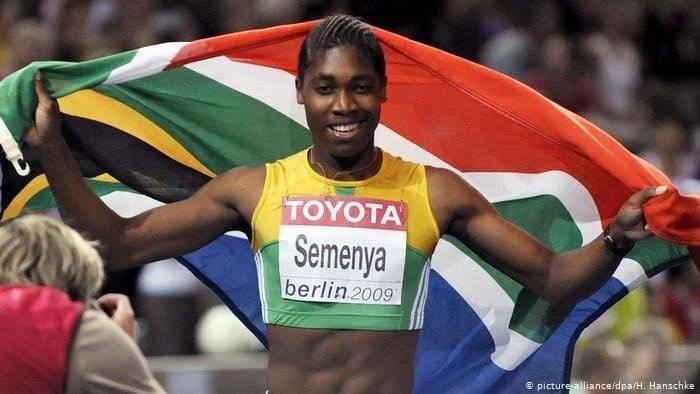When South African Olympic champion Caster Semenya took to the track in the 2009 World Championship in Berlin at 18, she captured the interest of many. She won the race but the conversation was not about her win but her gender.
Is she a man or a woman? Should she be allowed to compete against women? In this blog post, we explore this story as we tell you what happened to Caster Semenya.
Become an insider. Subscribe to our newsletter for more top trending stories like this!
People Also Read: 10 Best Black Female Track Stars to Watch
The 2009 Berlin Championships. Where It All Started.
Caster Semenya arrived at the 2009 Berlin Championships having won the Africa Junior Championship in some of the fastest times seen; the 800m in 1:56:72 and 1500m in 4:08:01. In the process, she improved the time ran in the 800m by seven seconds and ran a world-leading time.
During the World Championships, she ran a world-leading time of 1:55:45 in the 800m.
Join our Spotcovery Global Black Community Facebook Group for early access to exclusive content and to share in a lively discussion.
Sex-Verification Tests
Caster Semenya’s performances raised suspicion over possible drug use and her gender. She was subjected to gender verification tests by World Athletics, formerly the International Association of Athletics Federation (IAAF).
A spokesperson at the federation insisted that they are obligated to test athletes whenever suspicion arises. True as that may be, her medical information somehow made its way into the public, and Semenya became known more for her medical condition than her running.
This was the beginning of more than a decade’s fight by Caster Semenya fighting for her right to run.
People Also Read: Black Sprinter, Top 10 Fastest Athletes in the World
Caster Semenya Continued Racing
After the gender verification tests, Caster Semenya was cleared to compete in the 800m and 1500m races. She participated in the 2011 World Championships in Daegu, South Korea, the Olympic Games in London in 2012, and the Rio Olympics in 2016.
In Daegu, Semenya finished second at 1:57:23; similarly, in London 2012, she won gold after her silver medal was upgraded and clinched a gold medal in Rio in the 800m.
Join our Spotcovery Global Black Community Facebook Group for early access to exclusive content and to share in a lively discussion.
Regulation Changes and Its Impact on Caster Semenya
In 2011, World Athletics implemented rules that mandated the supervision of athletes with high testosterone levels. They stipulated the maximum limit, and if any female athletes surpassed that, they had to lower their levels to compete.
In 2015, the Court of Arbitration for Sport (CAS) suspended this decision and gave World Athletics two years to table evidence that testosterone creates an advantage. The President of the body, Sebastian Coe, said they’d challenge the ruling.
“We were surprised by the CAS decision, and I think the IOC was too. We are looking again at this issue and will be talking to CAS at some time over the next year.” Coe told insidethegames.biz
In 2018, World Athletics reintroduced new regulations that mandated athletes like Semenya to lower their naturally high-occurring levels of testosterone. The restrictions affected events that Semenya competes in: the 400m, 800m and 1500m. The application of the rules started in 2019.
In the same year, Caster Semenya revealed her intention to challenge World Athletics’ new regulation. She approached the Court of Arbitration for Sport (CAS) and argued that the rules were discriminatory.
However, in its ruling, CAS acknowledged that although the regulation was discriminatory, it was “necessary, reasonable and proportionate” to maintain fair competition.
In response, Semenya said: “I will continue to fight for the human rights of female athletes, both on the track and off the track, until we can all run free the way we were born. I know what is right and will do all I can to protect basic human rights, for young girls everywhere.”
Become an insider. Subscribe to our newsletter for more top trending stories like this!
Caster Semenya approached the Swiss Federal Supreme Court, which ordered World Athletics to suspend its rules. It was a short-lived victory as the court later upheld CAS’s decision. Semenya missed out on the 2019 World Championships in Doha.
In 2021, Caster Semenya approached the European Court for Human Rights to overturn the regulations imposed by World Athletics and upheld by CAS and the Swiss Federal Supreme Court. The verdict of her case is yet to be issued.
People Also Read: Black Representation in Sports. What You Need to Know
Caster Semenya’s Condition Explained
Caster Semenya has naturally high-occurring testosterone levels, a condition referred to as hyperandrogenism. As a result, athletes like Semenya have increased muscle mass, power, and strength, giving them an advantage over women with normal testosterone levels.
Thus, these athletes need to take hormones to lower their levels to a specific limit to compete. Semenya, who has used these treatments previously, said that it gave her unwanted side effects, like making her prone to injury.
People Also Read: 10 Incredible Female Black Soccer Players You Should Know
Where’s Caster Semenya Now?
After unsuccessfully battling to run in her special events of 400m to the mile, Caster Semenya has moved up to the 5, 000m. However, although she hasn’t competed in any majors, she is continuously making improvements. In 2022, she registered a personal best of 15:31:50.
Nonetheless, she is targeting the Olympics in Paris in 2024. She told a South African website City Press that she is using this time to prepare herself.
“My fitness levels will decide my destiny. If my body allows me to go to Budapest, I’ll go. But I’m not going to chase it the qualifying time it will come to me, as always,” Semenya told City Press.
“The target will be the Olympics. Not that this season is not important, but I’m still maturing in the long distance. I’m in the adaptation phase, and my body is starting to fit with it. I’m just enjoying myself at the moment, and things will fall into place at the right time.”
Semenya might also be preparing for life after, as she now works as an assistant coach to her former trainer Samuel Sepang.
Caster Semenya might never compete in the 400m to mile races but she has demonstrated bravery despite intense scrutiny over her body. Her resilience shows why she made it to the top.
Nearly 80% of consumers visit directories with reviews to find a local business. List your business for free in our exclusive Spotcovery Black-Owned Business Directory.
Spotcovery offers unique and fresh daily content on Black culture, lifestyle, and experiences. We talk about everything black, black people, black-owned and black-owned businesses. We also deliver authentic and relevant content that will inform, inspire and empower you! The future of black media is critical to today’s black experience! Our primary audience includes African American, African, Afro-Caribbean, and people of African heritage. Black culture is for the culture!
Become an insider. Subscribe to our newsletter for more top trending stories like this!





